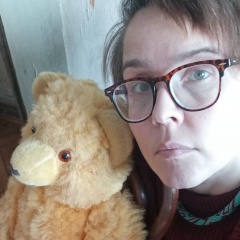Автор: https://www.facebook.com/alexander.ilichevsky?fref=nf
Ностальгия - это что-то продолжительно бессмысленное, вроде того, как Янковский в фильме Тарковского, посреди Тосканы, глядит на пустую бутылку "Русской водки" под ногами. А вот узнавание запахов детства - это род озарения, когда несколько капель вечной жизни попадают на пересохший язык.
Например, когда слышишь (теперь оч. редко где) - запах углекислоты, - это мгновенный способ ощутить спасительное утоление жажды (баллоны сзади автоматов газводы травят). Или вкус мороженного из дымного ящика с сухим льдом. В детстве вода на жаре была счастьем и удачей - это сейчас в ходу пластиковые бутыли и рюкзаки-поильники, а тогда напиться во время похода значило: выйти из лесу к деревне, найти колодец, да еще подраться с местными; или на реке расчистить родничок и припасть к хрустальному фонтанчику с песчинками, зубы ломит.
А запах креозота? Он исчез совсем - уже в моем детстве все более или менее серьезные дороги были с железобетонными шпалами. Креозот - и то уже выветрившийся, можно было унюхать у телеграфных старых столбов и на узкоколейках. Теперь я его слышу только на старом вокзале Тель-Авива, где в точности реставрировали подъездной участок: музейный запах. Почему не создать музей запахов? Я бы вдохнул пороховой запах Бородинской битвы. Или запах зарослей папоротника и хвоща - аромат палеозоя.
Казанская железка воняла тамбуром скорого поезда, мазутом, протекшим с цистерн, и горячей зеркальной сталью.
Креозотом еще пропитывали кабельные катушки - циклопические бобины с нитками великана: толщиной в руку кабелем, обмотанным промасленной бумагой и облитым гудроном. А вместе с этими катушками появляется и Вен. Ерофеев на кабельных работах под Лобней: строительный вагончик, горизонт, с низких облаков свисают до земли космы дождя, на березе ссорятся мокрые галки, раскисший октябрь; капли трогают черную воду в канаве, облетевшая лесополоса, по ее краю бежит с поджатым хвостом собака; рабочие в вагончике разливают и звонко сдают буру замусоленной распухшей колодой. У траншеи темнеют эти катушки с кабелем, а Вен. Ерофеев, сидя на пороге вечности, посматривает зорко на бегущую собаку и в конторской тетради выводит шариковой ручкой последнюю русскую прозу.
Ностальгия - это что-то продолжительно бессмысленное, вроде того, как Янковский в фильме Тарковского, посреди Тосканы, глядит на пустую бутылку "Русской водки" под ногами. А вот узнавание запахов детства - это род озарения, когда несколько капель вечной жизни попадают на пересохший язык.
Например, когда слышишь (теперь оч. редко где) - запах углекислоты, - это мгновенный способ ощутить спасительное утоление жажды (баллоны сзади автоматов газводы травят). Или вкус мороженного из дымного ящика с сухим льдом. В детстве вода на жаре была счастьем и удачей - это сейчас в ходу пластиковые бутыли и рюкзаки-поильники, а тогда напиться во время похода значило: выйти из лесу к деревне, найти колодец, да еще подраться с местными; или на реке расчистить родничок и припасть к хрустальному фонтанчику с песчинками, зубы ломит.
А запах креозота? Он исчез совсем - уже в моем детстве все более или менее серьезные дороги были с железобетонными шпалами. Креозот - и то уже выветрившийся, можно было унюхать у телеграфных старых столбов и на узкоколейках. Теперь я его слышу только на старом вокзале Тель-Авива, где в точности реставрировали подъездной участок: музейный запах. Почему не создать музей запахов? Я бы вдохнул пороховой запах Бородинской битвы. Или запах зарослей папоротника и хвоща - аромат палеозоя.
Казанская железка воняла тамбуром скорого поезда, мазутом, протекшим с цистерн, и горячей зеркальной сталью.
Креозотом еще пропитывали кабельные катушки - циклопические бобины с нитками великана: толщиной в руку кабелем, обмотанным промасленной бумагой и облитым гудроном. А вместе с этими катушками появляется и Вен. Ерофеев на кабельных работах под Лобней: строительный вагончик, горизонт, с низких облаков свисают до земли космы дождя, на березе ссорятся мокрые галки, раскисший октябрь; капли трогают черную воду в канаве, облетевшая лесополоса, по ее краю бежит с поджатым хвостом собака; рабочие в вагончике разливают и звонко сдают буру замусоленной распухшей колодой. У траншеи темнеют эти катушки с кабелем, а Вен. Ерофеев, сидя на пороге вечности, посматривает зорко на бегущую собаку и в конторской тетради выводит шариковой ручкой последнюю русскую прозу.
Author: https://www.facebook.com/alexander.ilichevsky?fref=nf
Nostalgia is something meaningless for a long time, like how Yankovsky looks at an empty bottle of Russian Vodka under his feet in a Tarkovsky film in the middle of Tuscany. But recognition of childhood smells is a kind of insight, when a few drops of eternal life fall on a parched tongue.
For example, when you hear (now very rarely) - the smell of carbonic acid - this is an instant way to feel the saving quenching of thirst (cylinders behind the gas guns are poisoned). Or the taste of ice cream from a smoky box with dry ice. In childhood, the water in the heat was happiness and good luck - plastic bottles and drinking bags were running now, and then getting drunk during the hike meant: getting out of the forest to the village, finding a well, and even fighting with the locals; or on the river, clear the spring and fall to the crystal fountain with grains of sand, teeth ache.
And the smell of creosote? He disappeared completely - already in my childhood all more or less serious roads were with reinforced concrete sleepers. Creosote, and already weathered, could be smelled by old telegraph poles and narrow gauge railways. Now I hear him only at the old station of Tel Aviv, where exactly the access road was restored: the museum smell. Why not create a museum of smells? I would inhale the powder smell of the Battle of Borodino. Or the smell of thickets of fern and horsetail - the aroma of Paleozoic.
The Kazan piece of iron stinked the platform of a fast train, fuel oil leaked from tanks, and hot mirror steel.
Cable coils, cyclopean reels with giant threads, were also impregnated with creosote: the cable was thick with a hand, wrapped in oiled paper and covered with tar. And with these coils, Ven appears. Yerofeyev at cable works under Lobney: a construction trailer, a horizon, rain falls from the low clouds to the ground, wet jackdaws quarrel on a birch tree, rakish October; drops touch black water in a ditch that has flown over a forest belt; a dog runs along its edge with a pursed tail; the workers in the trailer pour out and loudly give the drill to the greasy swollen deck. The trenches darken these cable reels, and Ven. Yerofeev, sitting on the threshold of eternity, gazes vigilantly at a running dog and in his office notebook displays the last Russian prose with a ballpoint pen.
Nostalgia is something meaningless for a long time, like how Yankovsky looks at an empty bottle of Russian Vodka under his feet in a Tarkovsky film in the middle of Tuscany. But recognition of childhood smells is a kind of insight, when a few drops of eternal life fall on a parched tongue.
For example, when you hear (now very rarely) - the smell of carbonic acid - this is an instant way to feel the saving quenching of thirst (cylinders behind the gas guns are poisoned). Or the taste of ice cream from a smoky box with dry ice. In childhood, the water in the heat was happiness and good luck - plastic bottles and drinking bags were running now, and then getting drunk during the hike meant: getting out of the forest to the village, finding a well, and even fighting with the locals; or on the river, clear the spring and fall to the crystal fountain with grains of sand, teeth ache.
And the smell of creosote? He disappeared completely - already in my childhood all more or less serious roads were with reinforced concrete sleepers. Creosote, and already weathered, could be smelled by old telegraph poles and narrow gauge railways. Now I hear him only at the old station of Tel Aviv, where exactly the access road was restored: the museum smell. Why not create a museum of smells? I would inhale the powder smell of the Battle of Borodino. Or the smell of thickets of fern and horsetail - the aroma of Paleozoic.
The Kazan piece of iron stinked the platform of a fast train, fuel oil leaked from tanks, and hot mirror steel.
Cable coils, cyclopean reels with giant threads, were also impregnated with creosote: the cable was thick with a hand, wrapped in oiled paper and covered with tar. And with these coils, Ven appears. Yerofeyev at cable works under Lobney: a construction trailer, a horizon, rain falls from the low clouds to the ground, wet jackdaws quarrel on a birch tree, rakish October; drops touch black water in a ditch that has flown over a forest belt; a dog runs along its edge with a pursed tail; the workers in the trailer pour out and loudly give the drill to the greasy swollen deck. The trenches darken these cable reels, and Ven. Yerofeev, sitting on the threshold of eternity, gazes vigilantly at a running dog and in his office notebook displays the last Russian prose with a ballpoint pen.
У записи 3 лайков,
0 репостов.
0 репостов.
Эту запись оставил(а) на своей стене Юлия Измайлова























